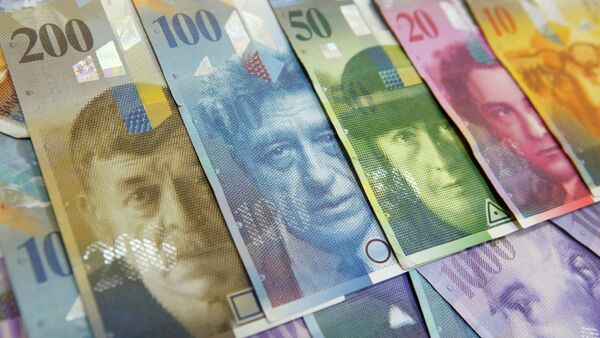MOSCOW, January 16 (Sputnik), Anastasia Levchenko — Swiss pharmaceutical giant Novartis, unlike other exporters in the country, is keeping calm after the decision of the central bank to remove the currency exchange ceiling and says it only reflects the strengthening of the franc, the company's press officer told Sputnik Friday.
On Thursday, the Swiss National Bank (SNB) removed the minimum exchange rate for the franc against the Euro (1.20 franc per Euro), which was introduced in 2011 amid the Eurozone crisis. One of the reasons for its implementation back in 2011 was to protect the interests of the country's exporting companies. Thursday's decision triggered reports in the media about Swiss exporters fearing future losses, as their products would become more expensive.
The strengthening of the Swiss franc will trigger a decrease in the company's operating income in US dollars and may change Novartis' reported earnings, but will not harm revenues in general, the press officer explained.
"Novartis reports its financial results in US dollars. As a result, fluctuations in the exchange rates between the US dollar and other currencies could have a significant effect on both the results of the Group's operations and the reported value of our assets, liabilities and cash flows. This in turn may affect reported earnings and the comparability of results over time," Masov said.
Another major Swiss exporter, the Swatch Group watch producer, has expressed a much greater concern following SNB's Thursday announcement.
"Words fail me! Jordan [Thomas Jordan, SNB head] is not only the name of the SNB president, but also of a river… and today's SNB action is a tsunami; for the export industry and for tourism, and finally for the entire country," Swatch Group CEO Nick Hayek said in a statement e-mailed to Sputnik.
Explaining the reasons for SNB's decision at a press conference on Thursday, Thomas Jordan cited the decreased overvaluation of the franc. The Swiss currency was significantly overvalued during the period of high levels of uncertainty at the Eurozone financial markets. Today, however, "enforcing and maintaining the minimum exchange rate for the Swiss franc against Euro is no longer justified," Jordan concluded.


